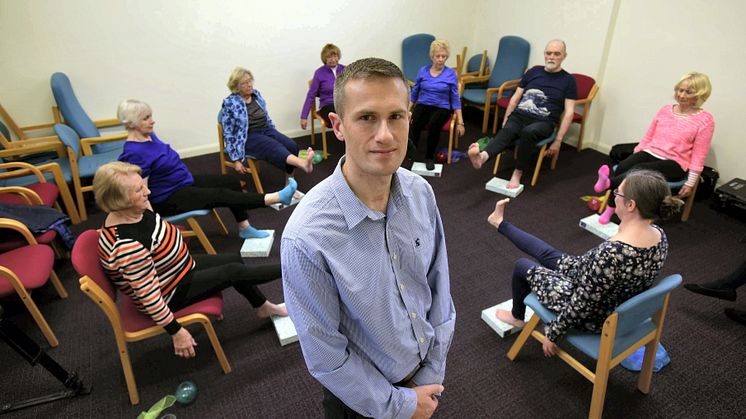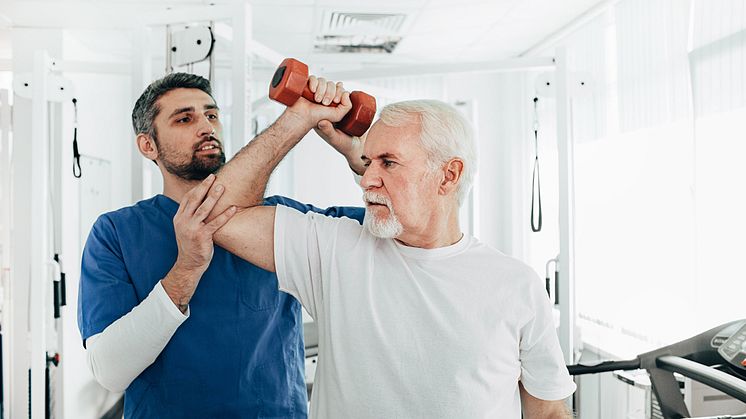
Press release -
Impact and resistance training boosts bone strength and muscle function in those with Crohn’s disease, according to new research
Research from Northumbria University, Newcastle, has shown the important role specific types of exercise can play in the management of bone loss, fatigue and muscle dysfunction for those with Crohn’s disease.
Crohn's disease is a type of inflammatory bowel disease which is estimated to affect about one in every 650 people in the UK. It causes inflammation of parts of the digestive system, which can lead to abdominal pain, severe diarrhoea, fatigue, weight loss and malnutrition.
People with Crohn’s are also more at risk of developing thinner and weaker bones – osteoporosis – due to factors such as inflammation of the gut, low levels of calcium and vitamin D, taking steroids or removal of parts of the small bowel. Reduced muscle strength in comparison to the general population is also common.
Having thinner or weaker bones can lead to them fracturing more easily. Likewise, muscle dysfunction can cause physical disability and contributes to fatigue which is a common symptom.
Until now, scientific evidence of the effects of exercise on people with Crohn’s disease has been sparse - studies have focused on modes of exercise which have proven to be less effective in improving bone health, such as walking, cycling or yoga.
In this latest research, published in the medical journal Alimentary Pharmacology & Therapeutics online today, scientists investigated the effects of an impact and resistance training programme on people with Crohn’s. They found that these types of exercise led to meaningful improvements in participants’ bone and muscle health, therefore decreasing their risk of sustaining a fracture.
Led by Dr Garry Tew, Associate Professor of Exercise and Health Sciences and Katherine Jones, PhD student from the Department of Sport, Exercise & Rehabilitation at Northumbria, the research is a collaboration with clinical colleagues from Newcastle Hospitals NHS Foundation Trust.
Impact and resistance training on trial
Previous research in the general population has shown that exercise training comprising a combination of impact activities, such as jumping, and high-intensity resistance training can have beneficial effects on bone mass and strength. Meanwhile resistance training has also been shown to improve muscle mass and function.
Working with consultant gastroenterologists Dr Ally Speight and Dr Nick Thompson from the Department of Gastroenterology at Newcastle Hospitals, the research team evaluated whether this type of exercise training could reduce the future risk of osteoporotic fractures and disability in adults with Crohn's disease.
In this novel study, 47 patients with Crohn’s disease with an average age of 49 took part in a six-month impact and resistance training programme. Participants were encouraged to complete three, 60-minute exercise sessions on non-consecutive days each week for 26 consecutive weeks.
Each session involved a combination of impact exercises, such as rope skipping, broad jumps and squat jumps, and high-effort resistance exercises including lunges, press-ups and bicep curls using TheraBand® elastic bands.
After six months, results demonstrated that the exercise programme had produced meaningful improvements in a range of bone and muscle health outcomes. On average, patients bone mineral density improved by 3.8% and 2.3% at the lumbar spine and femoral neck, respectively.
Such improvements are significant: recent research efforts indicated that a 2% improvement in lumbar spine or femoral neck bone mineral density was associated with a 28% reduction in vertebral fracture risk, and a 15-22% reduction in hip fracture risk.
Dr Garry Tew says: “Clinical guidelines on the management of inflammatory bowel disease state that weight-bearing and resistive exercises should be promoted to help prevent bone loss. However, specific exercise prescriptions are currently not provided and the recommendation is based largely on research in the general population.
“This study provides novel and important data on the feasibility and efficacy of a specific bone-loading and muscle-strengthening exercise programme in adults with Crohn's disease. This may help guide clinical practice so that patients can be provided with a specific exercise prescription that is supported by research evidence” he added.
Dr Nick Thompson said: “Muscle weakness and bone thinning are important consequences of Crohn’s disease and can seriously impact on a patient’s quality of life through fatigue and increased risk of a fracture. These exercise programmes look to empower patients to help improve muscle and bone strength.”
Topics
Categories
Northumbria is a research-rich, business-focused, professional university with a global reputation for academic excellence. Find out more about us at www.northumbria.ac.uk --- Please contact our Media and Communications team at media.communications@northumbria.ac.uk with any media enquiries or interview requests ---









